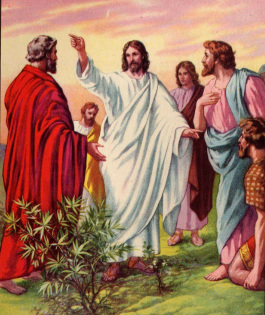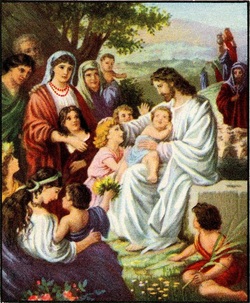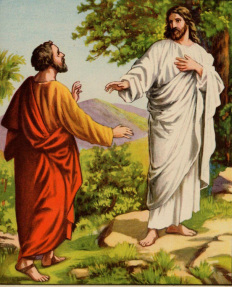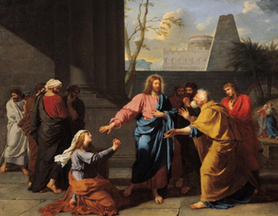
"Lord, wilt Thou that we command fire from Heaven to come down and consume them?"
"You know not of what spirit you are," He answered quietly; "the Son of Man came not to destroy souls but to save."
People who did not do as they did were sure to be in the wrong. "Master," said John to Him, "we saw one casting out devils in Thy Name who followeth not us, and we forbade him." " Do not forbid him," Jesus answered; "he that is not against you is for you." He had been telling the Twelve to try to gain by gentleness a brother who might have offended them.
"How often shall my brother offend against me and I forgive him? till seven times?" said Peter, thinking this a great stretch of generosity. "I say not to thee till seven times," Jesus answered, " but till seventy times seven times."
One day a young man came running up to Jesus, and, kneeling before Him, said: "Good Master, what shall I do that I may receive life everlasting ?" Our Lord told him that he must keep the Commandments. "All these have I kept from my youth: what is yet wanting to me?" he said, and looked up with innocent eyes into the face of Jesus. He spoke truly, his soul was beautiful in the sight of God. And Jesus looking on Him loved him and said to him:
"One thing is wanting to thee; if thou wilt be perfect, go sell all whatsoever thou hast, and give to the poor, and thou shalt have treasure in Heaven, and come, follow Me." When the young man heard this he went away sad, for he had great possessions. And Jesus, seeing him become sad, looking round about, said to His disciples:
"Children, how hard it is for them that trust in riches to enter into the Kingdom of God. It is easier for a camel to pass through the eye of a needle than for a rich man to enter into the Kingdom of God." Then Peter answering, said to Him: "Behold, we have left all things and have followed Thee: what therefore shall we have?" Instead of reproving this fisherman for talking about leaving all things, Jesus said to him:
"Amen, I say to you, that you who have followed Me, when the Son of Man shall sit on the seat of His majesty, you also shall sit on twelve thrones judging the twelve tribes of Israel." Perhaps it was this promise of thrones that made James and John ask a little later for the first place in the Kingdom that was coming. Our Lord was not angry with them, but wonderfully indulgent and patient.
He saw that the faults of His Apostles were on the surface only, so much on the surface, indeed, that they were very visible. But their hearts were right. They were simple and straightforward, having no secrets from Him, coming out with all that they felt without caring whether it might meet with a reproof. And when He did reprove, they were docile and saw their fault, and were sorry and began to try again. There was no sulking, no keeping away from Him after a rebuke. And often there was something good and generous even in their failures. If James and John were hard upon the Samaritan city, it was because they could not bear to see their Master treated with disrespect. If they asked for the first places in His Kingdom, it was that they might be near Him. And if Peter inquired whether he should forgive seven times, it was from the fear that such generosity might perhaps be excessive. They spoke of having left all for Christ because they had left willingly the little they had, and would have left palaces and all the wealth of this world had it been theirs.
Dear Apostles of our Lord! with all their shortcomings, how delightful they are, how charming in their simplicity and in the devotedness of their rough, tender hearts. We could not spare one single word they say, one act of loving ambition, or faulty zeal. But for them we should never have known our Blessed Saviour as we do. It is encouraging to find that in
spite of His teaching and blessed example always before their eyes, they remained for a long time so imperfect. It helps us to see them struggling with the same passions we have to fight, and falling again and again into the same faults.
One, one only among His Twelve disappointed the Master and lay like a dead weight on His Heart, that one on whom all His teaching and deeds of mercy and of power were thrown away, who hardened himself more and more now that the prospects of an earthly kingdom
seemed to be vanishing. Judas remained indeed in the little company and followed his Master still, but in body only. He had long since ceased to care for Him who had called him. His life was all pretense; his prayers with the others, his teaching of the people, his conversations with our Lord when he was obliged to speak—all this was acting. We never find him asking questions like the rest when their Master was instructing them. He did not care to learn, for he did not mean to improve. There was only one thing he really cared for now, and that was—money. Little by little he had let this love of money take possession of him, till at last all his thought was to get it, no matter how. He had charge of the purse which contained the alms given for the support of our Lord and the Apostles, and the poor. He began to steal from this purse. The first time his conscience reproached him terribly and made him very unhappy. He was afraid, too, that our Lord, who of course knew of his theft, might reprove him for it before his fellow-Apostles. But as time went on and his Master said nothing, at least in public, he grew bolder and took more and more. Jesus loved him tenderly still. He had called him to be an Apostle because He loved him and saw in his soul what pleased Him, and He warned him again and again to beware of the covetousness which like poison was killing all the good that was there. He kept him in His company, He treated him like the rest, sent him out to preach, gave him power to cast out devils and to cure, spoke to him kindly, tried to win him—but all in vain. The agony He felt at the gradual falling away of the poor, miserable Apostle comes out when He speaks of His coming Passion. He mentions a few only of the sufferings that were in store for Him, the sharpest, and chiefly the pains of the soul—mocking, spitting, betrayal. This last was the worst. He could bear insult and cruelty from the Gentiles who knew Him not, but betrayal from one of His own ! Oh, the anguish there is in those words at the Last Supper:
"Amen, I say to you, one of you shall betray Me!"
Our Lord was praying one day whilst His disciples stood at a little distance watching Him. They never tired of seeing Him at prayer. His stillness, His profound reverence, the fervour of soul that appeared on His countenance filled them with admiration and the desire to pray like Him. This day one of them said when His prayer was finished:
"Lord, teach us to pray, as John also taught his disciples."
The Prophets had taught them; the rabbis had taught them. Their prayers began with one or other of the Names by which God was known to the Jews: "the Strong One," "the Adorable," "the great Lord," "the God of Hosts," "the Most High," "the Almighty." One Name out of reverence they might never pronounce-- Jehovah, " He who is and will be." How will their Master have them speak to God ? by what dread Name must they call Him? See them gather round Him, eager, reverent. Watch their faces as He makes answer:
"When you pray say : Father, hallowed be Thy Name; Thy Kingdom come; give us this day our daily bread; and forgive us our sins as we also forgive our debtors; and lead us not into temptation." What a surprise, what a relief! No terrible Name, but "Father." They may speak to the God who made them as children to the most loving of fathers, and ask, not for great things only, but for little things, for the least things, for everything. They remember how long ago He said to them: "Thus, therefore shall you pray: Our Father who art in Heaven, hallowed be Thy Name; Thy Kingdom come; Thy Will be done on earth as it is in Heaven." It was a little shorter now, but the same prayer. " Father, Our Father " the prayer for all. He makes no exception; the poorest, then, the most ignorant, the most guilty have a right to look up and say: "Our Father who art in Heaven." Yes, there is nothing our Lord has more at heart than this—to see us go to our Heavenly Father with great confidence and ask again and again for all we want, persisting if we do not obtain at once. To show how we should persist, He told the people a parable of a man who goes at midnight to his friend and says to him: "Friend, lend me three loaves, for a friend of mine has come off his journey and I have nothing to set before him." He from within answers: "Trouble me not, the door is now shut, and my children are with me in bed, I cannot rise and give thee." "Yet," our Lord goes on, " if he shall continue knocking, I say unto you, although he will not rise and give him, because he is his friend, yet because of his importunity he will rise, and give him as many as he needeth. And I say unto you, Ask, and it shall be given you; seek, and you shall find; knock, and it shall be opened to you." We are to knock again and again, and louder and louder by persevering prayer till at last the door is opened. Any other friend would be annoyed at such persistence, but God loves it and delights to reward it, as He rewarded the perseverance of the Canaanite.
And here we may notice in passing what beautiful prayers, prayers we can all feel and say, prayers of sinners and needy ones like ourselves, the Gospel gives us:
"Lord, help me!" "Lord, if Thou wilt Thou canst make me clean." "Lord, save me, I perish!" "O
God, be merciful to me, a sinner !" It was about this time that our Lord chose seventy-two of His disciples and sent them two and two to preach. It was now, too, that He spoke that most beautiful parable of the Prodigal Son, to encourage all who have wandered from their Father's Home to return to the open arms and the welcome that await them there.
A certain man had two sons, and the younger of them said to his father: "Give me the portion of substance that falleth to me." He had all he needed to make him happy in that home of his—all but the spirit of contentment and gratitude. But, wanting these, he wanted everything. He was restless and dissatisfied. He thought he would be happier away from his father's eye, in some far off country where he would be his own master and could do just as he liked—no rules, no duties, no reminders, nothing but pleasure all day and all night, a good time always. His share of his father's wealth would have come to him on the old man's death, but he could not wait. So he went to his father and said: "Give me now what I shall have when you die." There was no reproach at the heartless words; the father divided all he had between his sons; and, not many days after, the younger, gathering all together, left home and set out for the far country. Many places that he passed on his way looked bright and tempting, but they were too near home; his father might come to hear of him and try to get him back. At last he was far enough. From the gay city here no news of him would ever reach his home. So he settled down and soon found himself surrounded by a number of young fellows, only too glad to make friends with a rich stranger, and be treated at his expense.
All went merrily for a while—as long as the money lasted. Then came a change. One by one his new friends left him, famine brought distress upon the country, and he began to be in want—the spoilt child of that wealthy home, in want! He hired himself to a man who sent him into his farm to feed swine. There, day after day he sat among them, cold, hungry, friendless, coveting the husks they ate. Then in the misery of his need came the memory of his home and of the plenty there:
"How many servants in my father's house abound with bread?" he said to himself, "and I here perish with hunger."
He thought of his wilfulness and ingratitude, and —oh, well for him that it was so! of the goodness of his father's heart. "I will arise," he said, " and will go to my father and say to him: Father, I have sinned against Heaven and before thee; I am not now worthy to be called thy son, make me as one of thy hired servants." To be back again under the old roof and earn his bread there as a hired servant was more than he deserved, but he would ask it of his father's charity. And he arose and set out on his way home. There was weariness to be faced, for the way was long. There was shame, too, as he drew near the old, familiar places. But no one knew him no one recognized in the ragged, miserable boy, starved and ill, the sprightly young fellow who had turned his back on home and gone far away and been lost sight of. No one ? Yes, there was one who knew him, one who had never lost sight of him, who had watched for him daily, who was watching now. When he was yet a great way off his father saw him and was moved with compassion, and, running to him, fell upon his neck and kissed him. The poor boy fell on his knees, and, covering his face with his hands, sobbed out:
"Father, I have sinned against Heaven and before thee, I am not now worthy to be called thy son."
No more; for his father's kiss had sealed his lips, and his father's arms were round him. And the servants were bidden to make haste lest any should see him in his disgrace—make haste to clothe him once more as a son, and put a ring on his hand and shoes on his poor, blistered feet, and prepare a feast with music and dancing that they might make merry and be glad because he had been dead and was come to life again, he had been lost and was found.
Perhaps we think God Himself could hardly be kinder than the father of the prodigal ? Our Lord did not think so; He knew He is much kinder, for after all the father did not go out into the far country to look for his son and bring him back. Yet this is what God has done for us. He has come all the way from Heaven into this world to seek us, and, when we are sorry for our sins and want to be better, it is the voice of God our Father calling us back to Him.
So our Lord made another parable of a good shepherd who left his ninety-nine obedient sheep to go after one that had strayed away from the fold and got lost in the mountains, where wild beasts live and prowl about at night in search of such foolish wanderers. The good shepherd goes after his sheep in the cold wind and the darkness and the rain, not minding his bleeding feet, cut by the sharp stones of the way. He gets upon a little height, and stands, and listens! And, when at last he hears its far off bleating cry, he hastens to where, over the side of the precipice, it stands on a narrow ledge, ready to fall into the depths below and be dashed to pieces. At the risk of his life he leans over and lifts it up and sets it in safety by his side. He does not beat, or scold it, or drive it back to the fold, but speaks to it tenderly, and strokes it, and lifts it on his shoulder rejoicing, and so carries it home, and, when he gets back to the fold, calls together his friends and neighbours, saying:
"Rejoice with me because I have found my sheep that was lost."
"I am the Good Shepherd," said our Lord, " and I lay down My life for My sheep." When He told this story the day was drawing near when He was going to give His life for His sheep. He was always thinking of that day and longing for it, because by His cruel death we, whom He loved so dearly, were to be saved.
A printable file of this chapter as well as a coloring picture are below.
|
| ||||



 RSS Feed
RSS Feed